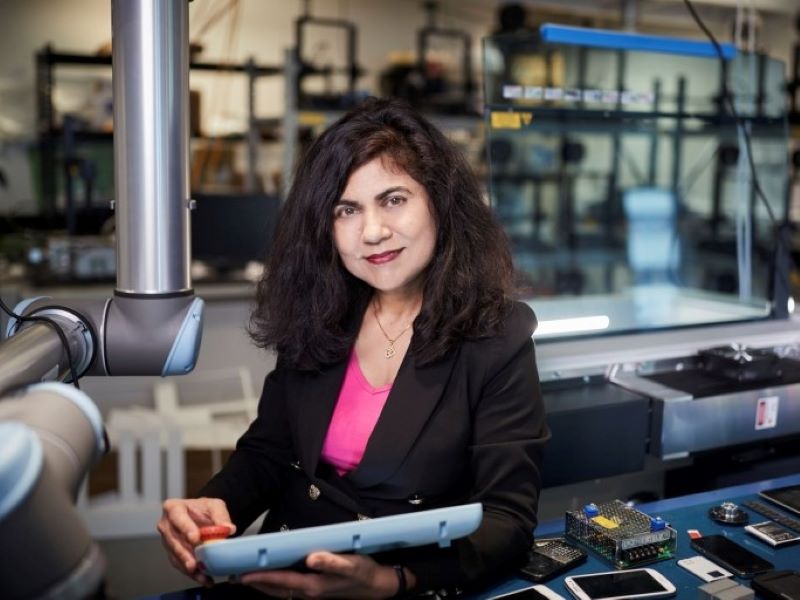Quantum computing, recycling, batteries and water electrolysers are among the research projects funded in the inaugural Industry Laureate Fellows scheme announced on Tuesday.
The Australian Research Council awarded $27.7 million for eight Industry Laureate Fellowships, supporting projects with research outcomes that benefit industry partners, end-users, and the economy.
The scheme is part of the former government’s Research Commercialisation Action Plan and creates a new Laureate Fellowship for researchers that work on an industry or end-user defined research challenge or opportunity.

In the first round, University of Adelaide landed three Industry Laurette Fellowships, while University of New South Wales had two. The University of Melbourne, University of Sydney and University of Wollongong each had one.
UNSW Professor Veena Sahajwalla will lead a $3.5 million innovation project with recycling and solar companies, and a local council as industry partners. The project aims to develop scalable technology to recover valuable metals from complex wastes, to be deployed locally and regionally, building on Professor Sahajwalla’s work developing recycling MICROfactories.
University spinout Diraq will partner with UNSW, the university it was spun out of last year – in a project led by Professor Alexander Hamilton. With a $3.8 million ARC grant, the project will develop silicon quantum computer technology and create new quantum components.
The project aims to speed up quantum computing capabilities at a time when the federal government sets ambitious targets for the sector, including Australia building a first-in-the-world error corrected quantum computer within ten years.
University of Wollongong Professor Gerhard Swiegers was awarded a Fellowship for a project aiming to advance the manufacture of high efficiency water electrolysers, a key component of green hydrogen.
Professor Swiegers’ $3.7 million project will partner with another spinout, Hysata, and expects to deliver a low-cost, simplified design, and ultra-high energy efficiency.
The other professors to receive an ARC Industry Laureate Fellowship are:
- Associate Professor Phillip Cassey, University of Adelaide ($3.8 million) for a project that aims to develop new digital and wildlife forensic tools to improve the surveillance and detection of the illegal killing and trade of wild animals and plants.
- Professor Heike Ebendorff-Heidepriem, University of Adelaide ($3.3 million) for a project to improve the purity and manufacturing scale of fluoride glass optical fibres. Improved fibres could lead to faster internet speeds, communication, and laser surgery applications.
- Professor Timothy Fletcher, University of Melbourne ($3.5 million) to investigate market-driven smart-grid of stormwater storages. This could provide consumers with non-potable water supply, while financially rewarding them for contributions to flood mitigation and environmental flows to waterways.
- Professor Shizhang Qiao, University of Adelaide ($3.5 million) for the design and commercialisation of safe, cost-effective, long-lasting, and fast-charging sodium-based batteries. The batteries could store renewable energy and manage the release of excess energy into power grids during peak demand.
- Professor Jennifer Smith-Merry, University of Sydney ($2.5 million) to attempt to address deficits in the National Disability Insurance Scheme for people with psychosocial disability. It aims to make the scheme more effective and efficient for this group.
ARC chief executive officer, Judi Zielke announced the Fellowships on Monday.
“Complementing the early and mid-career Industry Fellowship schemes, these outstanding laureate researchers bring experience and leadership to industry challenges,” she said.
“I look forward to seeing how these researchers translate their skills and knowledge into real world outcomes for industry partners and the Australian community — from speeding up decarbonisation with green hydrogen, to the manufacture of material that will transform internet speeds.”
“Australia can only benefit from the collaboration between researchers and industry.”
Funding for 25 Mid-Career Industry Fellowships was announced last month in a $24 million round. Another 50 projects for Early Career Industry Fellowships was announced on Friday.
Do you know more? Contact James Riley via Email.

